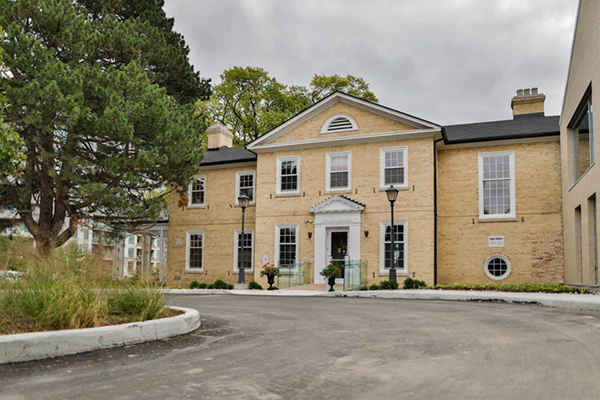Phillips House: Excellence in Child and Adolescent Mental Health and Eating Disorders

At the best of times, mental health conditions and addictions can be difficult to manage, without the added pressures of COVID-19. The pandemic’s toll on people’s mental health is increasingly being viewed as a crisis within a crisis.
As a major provider of services for mental health and addictions, North York General (NYGH) has adapted – seemingly overnight – to new approaches to support people through a tumultuous time.
The interdisciplinary care teams at Phillips House, home to NYGH’s child and adolescent outpatient mental health and adolescent outpatient Eating Disorders Programs, swiftly adapted to new methods of care delivery to ensure no one got left behind.
When the government announced the closure of non-essential businesses, schools, and childcare centres back in March, programs at Phillips House were quick to transition to virtual care. Not only did this ensure continued and timely support for patients, the virtual care model enabled the program to scale up new offerings and meet growing needs in the community brought on by the pandemic.
When it was once again safe to do so, Phillips House resumed in-person appointments for those who could not access virtual services or would benefit more from in-person support. “The goal is equitable access, flexibility, innovation and safety,” explains Jennifer Holmes-Haronitis, Clinical Team Manager of Child and Adolescent Mental Health and Eating Disorders Programs at North York General.
Virtual care allowed us to offer a similar breadth of services to the community, including psychiatric assessment, individual and group therapies as well as intensive day programming. “It was an adjustment with a lot of considerations, but we came together as a team and made care available to any patients or families willing and able to try virtual therapy,” says Jennifer.
Debra Levine, a Social Worker in Child and Adolescent Mental Health Services at NYGH, offers a few tips for parents to help their children cope with some of the issues that have emerged during COVID-19.
Prepare yourselves first – Kids can sense when parents are unsure or stressed, especially if that is a departure from your usual demeanour. It’s important for children to be able to trust you and your capacity to keep everyone safe. Parents should spend some time thinking about how best to handle their new situation. If needed, seek professional support for yourself to sustain you through these challenging times.
Look for signs – While it’s crucial to maintain healthy routines with regards to sleeping, eating, physical activity, socializing, and academic expectations, a change in any of these areas may signify a problem which could trigger further difficulties. Look for extremes (for instance, inability to sleep-or constant sleeping; no appetite-or uncontrollable eating). If you are concerned about your child’s well-being, consult with a staff member at school and with your family doctor.
Talk about it – Keep communication open and communicate often as a family. It’s good to share some of your own thoughts and feelings, covering a range of emotions. Sharing regularly and honestly establishes the home as a safe space to share experiences. It might also encourage others to speak more openly. If your child voices emotions related to these changing times, ensure you validate and understand the feelings before you move to reassurance and problem-solving.
Establish routines – Adequate sleep is key to a healthy lifestyle. Have a consistent bedtime and wake up time. Encourage some daily exercise. Nutrition and meals are important! Set up times that you can spend with your children and adolescents over a meal at least several times a week. Your child may be hesitant about removing their mask to have a snack at school. Find ways to make this nutrition break possible and not stressful.
Socialize Safely – Find ways to encourage and support socializing that suits the age of your child. The needs of a child compared to an adolescent are very different. Support safe and innovative ways for youth to stay engaged with their friends. If safe socializing in person is not possible then explore other ways to engage, including embracing modern technology, distanced park visits and walks.
Praise – You’ll likely observe your child or adolescent practicing positive and productive behaviours. Be sure to note and encourage it. Praise will go a long way in bringing out more of the desired behaviour.
What if – Kids will often wonder a myriad of “what ifs”. Take the opportunity to talk through it and help them voice their unspoken thoughts and worries. What is most on their minds is probably what is most on your mind. Reassure them that everyone is doing what they can to stay healthy; that there are health professionals who are helping to keep them safe and comfortable; that not every diagnosis is experienced in a scary way; and that there will always be someone to look after their needs.
The pandemic has created new challenges for children, youth and families, our team at Phillips House is here and ready to help.
Phillips House provides access to a range of therapeutic outpatient services for children and youth who may have emerging or diagnosed issues related to depression, anxiety, eating disorders, attention deficit hyperactivity disorder, adjustment and conduct disorders, substance abuse and other mental health conditions. The unique care facility was made possible through the generosity of our community and in partnership with the North York General Foundation. The redeveloped 12,000 square foot site is inviting and warm and was designed with the intent of creating a space in which children and youth feel supported, comfortable and have a positive experience.
